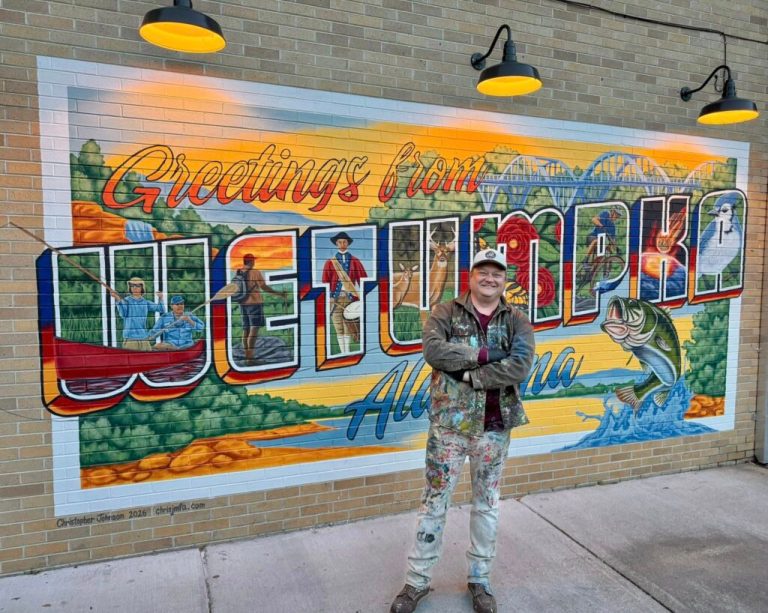Reviewed by: Nathan Watson
Mobile-based muralist has unique work featured in the Library of Congress
Reading time: 4 minutes

If you’ve been in downtown Mobile, you’re familiar with E. Allen Warren’s work, even if you haven’t noticed it. Toomey’s Mardi Gras, Penelope’s Closet thrift shop and Kraver’s Seafood are all adorned with art made by muralist E. Allen Warren.
We sat down with Warren to talk about creating 60-foot-tall murals, drawing inspiration from tragedy and the process of getting inducted into the Library of Congress.
Meet E. Allen Warren

Miami native E. Allen Warren has wanted to be an artist for as long as he can remember, at least since the first grade.
“I stood up [in class] and confidently declared ‘I’m going to be an artist!’ Since I was drawing pictures for my classmates in exchange for money, it wasn’t until much later that I realized I was in fact already a working artist.”
E. Allen Warren
Warren relocated to the Port City in 2012 and, since then, has worked on 30 murals (and counting!) across the Gulf Coast for patrons like:
- the City of Bayou la Batre
- Mobile County District Attorney Keith Blackwood
- County Commissioner Hudson
- Toomey’s Mardi Gras
- Kraver’s Seafood (on both sides of the bay)
- Hood’s Home Store (on both sides of the bay)
- World Marine LLC
- Judy’s Place

You can also find his works adorning charity groups in Mobile, like the Delta Bike Project and Penelope’s Closet. The Bike Project, located in downtown Mobile, was a collaborative effort between 20 muralists, including Warren.
Penelope’s Closet is a thrift and consignment shop benefitting a local women’s shelter.
“I organized crowd-funding for materials and donated my design-time and labor to paint the exterior of Penelope’s Closet. Domestic violence is an issue near and dear to my heart as I and several members of my family have been affected by it.”
E. Allen Warren


The process of painting a mural

The process of painting these larger-than-life murals isn’t an easy one. Warren’s design process begins with taking pictures of his canvas and using graphic design to create a mockup. From there, he’ll scale up the design using a grid system and he can get to sketching.
“Painting is my favorite medium but only a part of my overall process. It’s the last step actually… I’ll spend dozens of hours designing a large mural project or a painting on canvas… and typically spend almost as much time designing as I do painting.”
E. Allen Warren
After all those hours designing, Warren can finally put his brush on the wall—a process that can take a week or a month, depending on where his canvas is.
“Each mural is unique, both in time and degree of difficulty so determining the amount of time it will take to execute a mural is an educated guess that I make each time that I bid on a project…Projects that require lifts opposed to scaffolding or ladders typically take a bit longer.”
E. Allen Warren
Library of Congress
Like all great artists, Warren often works off inspiration. It was a different kind of inspiration that led him to file a copyright of his work with the Library of Congress.
“Once I decided to have prints made of a well received niche painting based upon the movie, The Big Lebowski, a copyright seemed like the right thing to do to protect my work. The Library of Congress oversees copyrights. For a nominal fee an artist can have their work copyrighted and I recommend it to any artist that intends to sell prints.”
E. Allen Warren
What’s next?

Warren is currently working on one of his largest pieces to date, a 239-foot-long mural on the side of Mobile Bay Harley Davidson.
Follow his Facebook to keep up with progress on that mural and check out his website for those limited-edition “Lebowski’s Last Sup” prints.
Oh, and if you know of a building owner looking to memorialize Jimmy Buffett, you know who to call. He’s already sketched it out for you.

Do you know an artist we should feature in our spotlight series? Send us their name + contact info on our Instagram, Facebook or LinkedIn!



